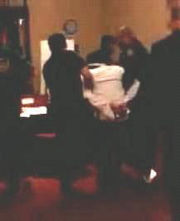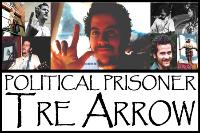Friday, February 2
UCLA Students "Taser-Welcomed" to Post-9/11 American Police State
American dissidence is invigorated when relatively privileged students at a premier university are brutally confronted with fascist police tactics. Historically, that type of American experience is reserved only for racial/ethnic and low-income groups.
But last November, police erred when they dished out such tactics higher up the American class ladder in Los Angeles, among those better educated and well-connected.
Several UCLA students were shaken and angered after watching--and hearing--a 23-year-old Iranian-American fellow student tazed by campus security officers after a late-night ID check at a campus computer lab; the victimized student didn't produce his ID in the manner requested, so campus cops ("thuggish gestapo" is more apropos) handcuffed and tazered him.
A student present during the incident used a cellphone to capture this six-minute video.
The episode rocked the UCLA campus, as suggested by the letter below from a UCLA law student (Class of '07; the letter is archived at the Muslim-Jewish-Christian Alliance for 9/11 Truth here.)
Dear Friends, Family and Colleagues,
I am forwarding you this video and story because I feel it's important.
An Iranian-American student at UCLA was recently tasered at the library when he did not respond "appropriately" to the on-campus police officers when asked for proper school identification. The student was handcuffed as he was being tasered and screamed repeatedly that he said he would leave the library. The story is below, so I will not repeat it -- but I will only say that we as a society have an obligation to stand up when something feels wrong. We allow instances of injustice to occur every time we remain silent. It saddens and enrages me that screening procedures appear to allow officers this amount of discretion when asking a student for their ID.
I invite you to watch this video and arrive at your own conclusions. Additionally, I encourage writing to the Provost condemning the amount of force used on this student and to also reevaluate "screening" procedures for the library. UC Alums, law students and Professors are especially encouraged.
The Acting Chancellor is Norman Abrams (an emeritus professor in the UCLA School of Law)
Telephone: 310-825-2151
Fax: 310-206-6030
chancellor@conet.ucla.edu
Address (
Address (Campus Mail):
Murphy Hall 2147
Campus: 140501
Sincerely,
Verónica Ramos
University of California Hastings College of the Law
JD Candidate, 2007
Video: http://www.youtube.com/watch?v=5g7zlJx9u2E
On 16 November, the UCLA student news paper reported the incident, excerpted below in its entirety.
Community responds to Taser use in Powell
Sarah Taylor DAILY BRUIN SENIOR STAFF
staylor@media.ucla.edu
An incident late Tuesday night in which a UCLA student was stunned at least four times with a Taser has left the UCLA community questioning whether the university police officers' use of force was an appropriate response to the situation.  Mostafa Tabatabainejad, a UCLA student [left], was repeatedly stunned with a Taser and then taken into custody when he did not exit the CLICC Lab in Powell Library in a timely manner. Community Service Officers had asked Tabatabainejad to leave after he failed to produce his BruinCard during a random check at around 11:30 p.m. Tuesday.
Mostafa Tabatabainejad, a UCLA student [left], was repeatedly stunned with a Taser and then taken into custody when he did not exit the CLICC Lab in Powell Library in a timely manner. Community Service Officers had asked Tabatabainejad to leave after he failed to produce his BruinCard during a random check at around 11:30 p.m. Tuesday.
UCPD Assistant Chief of Police Jeff Young said the checks are a standard procedure in the library after 11 p.m.
"Because of the safety of the students we limit the use after 11 to just students, staff and faculty," Young said.
Young said the CSOs on duty in the library at the time went to get UCPD officers when Tabatabainejad did not immediately leave, and UCPD officers resorted to use of the Taser when Tabatabainejad did not do as he was told.
A six-minute video showed Tabatabainejad audibly screaming in pain as he was stunned several times with a Taser, each time for three to five seconds. He was told repeatedly to stand up and stop fighting, and was told that if he did not do so he would "get Tased again."
Tabatabainejad was also stunned with the Taser when he was already handcuffed, said Carlos Zaragoza, a third-year English and history student who witnessed the incident.
"(He was) no possible danger to any of the police,"
But Young said at the time the police likely had no way of knowing whether the individual was armed or that he was a student.
As Tabatabainejad was being dragged through the room by two officers, he repeated in a strained scream, "I'm not fighting you" and "I said I would leave."
The officers used the "drive stun" setting in the Taser, which delivers a shock to a specific part of the body with the front of the Taser, Young said.
A Taser delivers volts of low-amperage energy to the body, causing a disruption of the body's electrical energy pulses and locking the muscles, according to a report by the American Civil Liberties Union.
"It's an electrical shock. ... It causes pain," Young said, adding that the drive stun would not likely demobilize a person or cause residual pain after the shock was administered. Young also said a Taser is less forceful than a baton, for example.
But others warned against underestimating the effects of a Taser.
"It is a real mistake to treat a Taser as some benign thing that painlessly brings people under control," said Peter Eliasberg, managing attorney at the ACLU of Southern California.
"The Taser can be incredibly violent and result in death," Eliasberg said.
According to an ACLU report, 148 people in the
During the altercation between Tabatabainejad and the officers, bystanders can be heard in the video repeatedly asking the officers to stop and requesting their names and identification numbers. The video showed one officer responding to a student by threatening that the student would "get Tased too." At this point, the officer was still holding a Taser.
Such a threat of the use of force by a law enforcement officer in response to a request for a badge number is an "illegal assault," Eliasberg said.
"It is absolutely illegal to threaten anyone who asks for a badge â€" that's assault," he said.
Tabatabainejad was released from custody after being given a citation for obstruction/delay of a peace officer in the performance of duty.
Neither Tabatabainejad nor his family were giving interviews Wednesday.
Police officers said they determined the use of Tasers was necessary when Tabatabainejad did not do as they asked.
According to a UCPD press release, Tabatabainejad went limp and refused to exit as the officers attempted to escort him out. The release also stated Tabatabainejad "encouraged library patrons to join his resistance." At this point, the officers "deemed it necessary to use the Taser in a "drive stun' capacity."
"He wasn't cooperative; he wouldn't identify himself. He resisted the officers," Young said.
Neither the video footage nor eyewitness accounts of the events confirmed that Tabatabainejad encouraged resistance, and he repeatedly told the officers he was not fighting and would leave.
Tabatabainejad was walking with his backpack toward the door when he was approached by two UCPD officers, one of whom grabbed the student's arm. In response, Tabatabainejad yelled at the officers to "get off me." Following this demand, Tabatabainejad was stunned with a Taser.
UCPD and the UCLA administration would not comment on the specifics of the incident as it is still under investigation.
In a statement released Wednesday, Interim Chancellor Norman Abrams said investigators were reviewing the situation and the officers' actions.
"I can assure you that these reviews will be thorough, vigorous and fair," Abrams said.
The incident, which
"I realize when looking at these kind of arrest tapes that they don't always show the full picture. ... But that six minutes that we can watch just seems like it's a ridiculous amount of force for someone being escorted because they forgot their BruinCard," said Ali Ghandour, a fourth-year anthropology student.
"It certainly makes you wonder. If something as small as forgetting your BruinCard can eventually lead to getting Tased several times in front of the library, then maybe we should all be a bit more worried about getting Tased," he added when asked if the incident made him more concerned about his personal safety.
Edouard Tchertchian, a third-year mathematics student, said he was concerned that the student was not offered any other means of showing that he was a UCLA student.
Wikipedia also supplies the following helpful piece of information on tasing policy at the University of California-Los Angeles, suggesting the actions of the officers made the university vulnerable to legal retaliation.
...UCPD policy on Tasering
The UCPD's policy on Tasering calls Tasers a "less lethal device," and says that "although not absolutely prohibited, officers should give additional consideration to the unique circumstances involved prior to applying the Taser to...Individuals who are handcuffed or otherwise restrained." According to the policy, the "Drive Stun" capacity is appropriate "to eliminate physical resistance from an arrestee in accomplishing an arrest or physical search" (6A) as well as "pain compliance against passive resistors" (6B).[28]
In comparison with other law enforcement agencies in the same locality, the Los Angeles Police Department and Los Angeles County Sheriff's Department permit officers to use Tasers only if a suspect poses a physical threat or is acting combatively, the latter expressly forbidding the use of Tasers simply to move someone.[21]
Of the ten UC campus police departments, six have equipped officers with Tasers, but only UCLA has a policy explicitly authorizing Tasers to be used as a pain-compliance tool against suspects who are passively resisting.[25]
Update: On 17 January 2007, the Los Angeles Times reported "UCLA student sues over tasering."
....In a 16-page lawsuit, Mostafa Tabatabainejad, 23, sued the university, campus police and a half-dozen officers for unspecified monetary damages, claiming they used excessive force and violated the Americans With Disabilities Act in the Nov. 14, 2006 incident.
Part of the confrontation was captured on video by a student using a cellphone and broadcast around the world, sparking widespread debate and protest.
Tabatabainejad was repeatedly stunned with a Taser after he refused to show his student ID card to a security guard. Authorities said the student wouldn't leave Powell Library, went limp and asked others to join his resistance.
....The suit noted that Tabatabainejad suffered from bipolar disorder but the officers' lack of training meant they treated him with "brutality instead of sensitivity," [Tabatabainejad's attorney Paul] Hoffman said.











